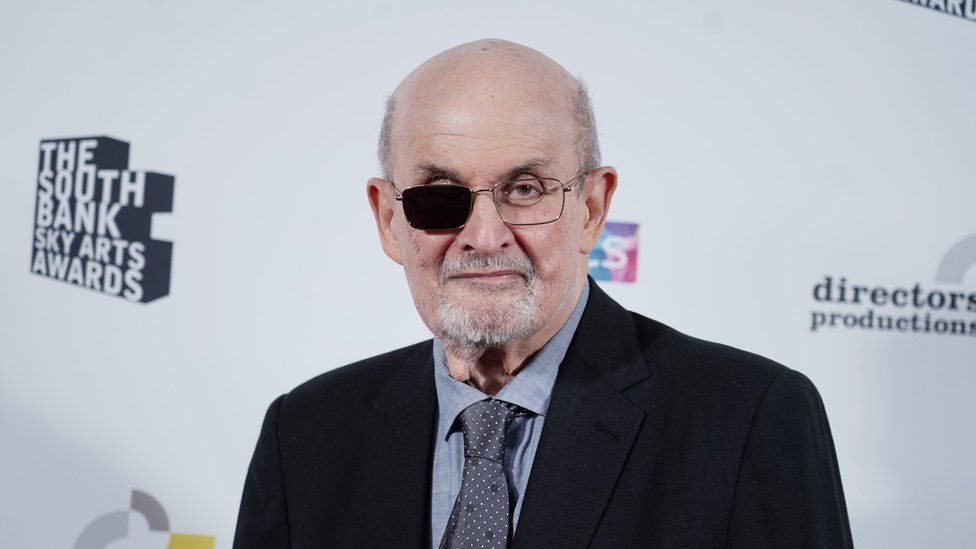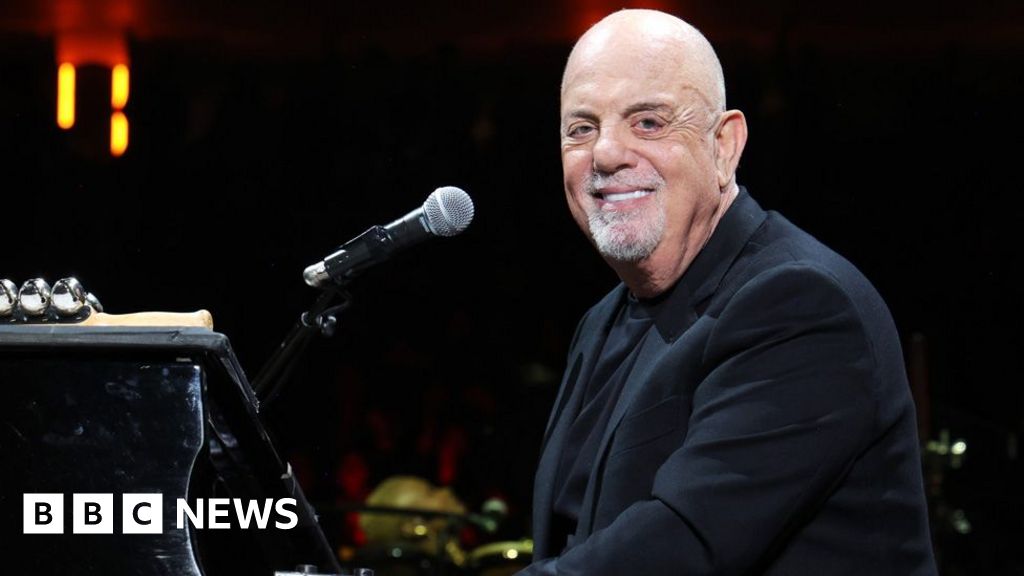ARTICLE AD BOX
 Image source, PA Media
Image source, PA Media
Sir Salman Rushdie before receiving his Outstanding Achievement award at the South Bank Sky Arts Awards at The Savoy in London on Sunday July 2, 2023
By Razia Iqbal & Leisha Chi-Santorelli
BBC News
Sir Salman Rushdie says he is physically "more or less OK" nearly a year after he was stabbed as he prepared to give a lecture in New York.
However the 76-year-old told the BBC he was still processing the incident, which left him blind in one eye.
"I have a very good therapist who has a lot of work to do," said the novelist. "I have crazy dreams."
Sir Salman said he was in "two minds" about whether to face his alleged attacker in court.
And he remains unsure if he will ever appear at a public event that isn't invitation-only and "controllable".
Last August, the Indian-born British-American author was put on a ventilator and spent six weeks in hospital after being stabbed up to 10 times on stage at an event in New York state.
The injuries resulted in damage to his liver, lost vision in one eye and a paralysed hand caused by nerve damage to his arm. The multiple prize-winning author said "the human body has an amazing capacity to heal. And so I'm fortunate to be well on that way".
The suspect, Hadi Matar, has been charged with attempted murder. He has pleaded not guilty and is being held without bail.
When asked if he will attend the trial later this year, Rushdie said: "There's one there's one bit of me that actually wants to go and stand on the court and look at him.
"And there's another bit of me that just can't be bothered. I don't have a very high opinion of him. And I think what is important to me now is that you're able to find life continuing. And I'm more engaged with the business of, you know, getting on with it."
Sir Salman is currently writing a book about the near-fatal stabbing incident as a means of processing what he has been through. He told the BBC it won't be more than a "couple of hundred of pages" long.
"There's this colossal elephant in the room and, until I deal with that, it is difficult to take seriously anything else," he added.
In a pre-recorded virtual appearance at the Hay literary festival in the UK last month, the author told the audience "it's not the easiest book in the world to write but it's something I need to get past in order to do anything else."
"That's the thing writers can do. They can outlast the thing that opposes them."
The author, who received death threats from Iran in the 1980s after his novel The Satanic Verses was published, currently has residency in both the US and the UK.
He told the BBC that in America he employs security on certain occasions and that the UK still offers him state protection "like the good old days".
"Writers don't have much power. We don't have armies," he told the BBC. "What we have is the ability to write about the world, if we're any good, that might endure."
Image source, PA Media
Image caption,The author's 1988 novel The Satanic Verses became a best-seller on both sides of the Atlantic
Sir Salman said the world had changed dramatically since The Satanic Verses was released in 1988, but that the radicalisation of religion remains a threat to society.
"You've got to distinguish between people's private faith, which is kind of none of our business, really, and the politicisation of any religion... In America right now, you've got a highly weaponised version of Christianity, which was responsible in very large part for the reversal of Roe versus Wade, for the whole abortion debate.
"I'm not a religious person. I never have been, and came from a family that wasn't particularly religious and we did alright... It's not a thing I need for myself but if there are people who need it, that's their business, not mine, until it becomes politicised.
"When it becomes politicised, it becomes everybody's business, as all political things do. I think we just have to be clear about that distinction.
"So the kind of person who goes off and chooses violence, in my view, is not a representative of that religion but a representative of violence and has to be treated in that way."Salman Rushdie: The writer who emerged from hiding
The Satanic Verses' depiction of the Islamic prophet Muhammad and its references to religion were considered blasphemous and banned in multiple Muslim-majority countries, including Iran. The controversial novel also led to violent demonstrations in Pakistan and the disputed Kashmir region.
Iran's then-leader Ayatollah Ruhollah Khomeini issued a fatwa - or religious decree - calling for Sir Salman's assassination and placed a $3m (£2.5m) bounty on the author's head. The fatwa remains active via a quasi-official religious foundation.
As a result, Sir Salman was forced into hiding for nearly a decade and required an armed bodyguard due to the number of death threats he received.
Image source, Reuters
Image caption,Sir Salman Rushdie was made a member of the Order of the Companions of Honour earlier this year
He has been largely absent from public life since the attack, with only a handful of media interviews and appearances at awards ceremonies and literary festivals.
His latest book, Victory City, was finished just before last year's attack and was well-received by critics. It revolves around a young child in medieval India who has a divine encounter that changes the course of history.
Sir Salman, who won the Booker Prize in 1981 for his second novel Midnight's Children, recently appeared in person to receive an outstanding achievement award in London for his body of work over the last fifty years.
Earlier this year he also made a rare in-person appearance in New York to receive the Centenary Courage Award from the non-profit organisation PEN America where he served as president from 2004 to 2006.
Sir Salman has long been an advocate for the freedom of expression and warned that it is coming under attack in the West.
In his wide-ranging BBC interview, the novelist also paid tribute to Milan Kundera, author of The Unbearable Lightness of Being, who has died aged 94 in Paris following a long illness.
"I've been thinking about him," Rushdie said. "[Milan Kundera] talks about laughter as being the way to deal with atrocity.
"Of course, in his case, the atrocity he's thinking of is communism and so on. But I think it's not bad advice."
Sir Salman, who has been married five times, named his second-born child after the Czech-born author.
Listen to the full interview from Newshour on BBC Sounds

 1 year ago
59
1 year ago
59








 English (US) ·
English (US) ·